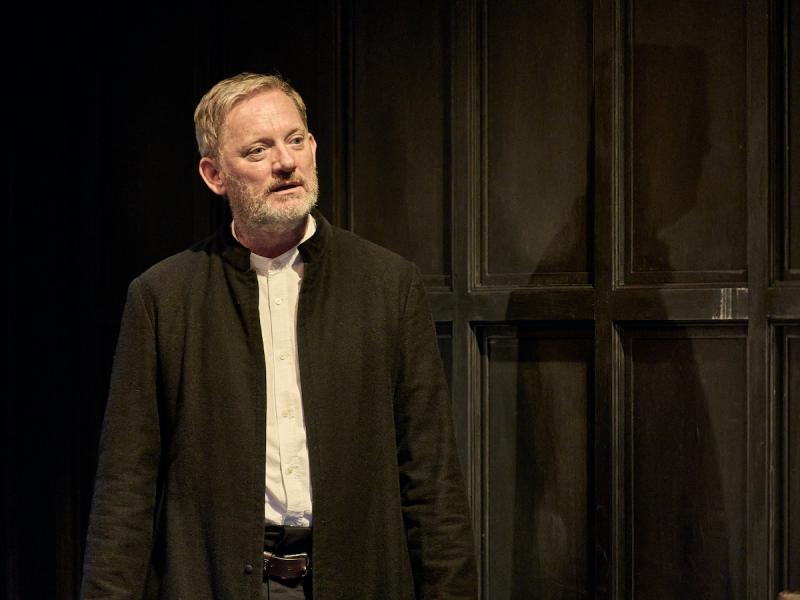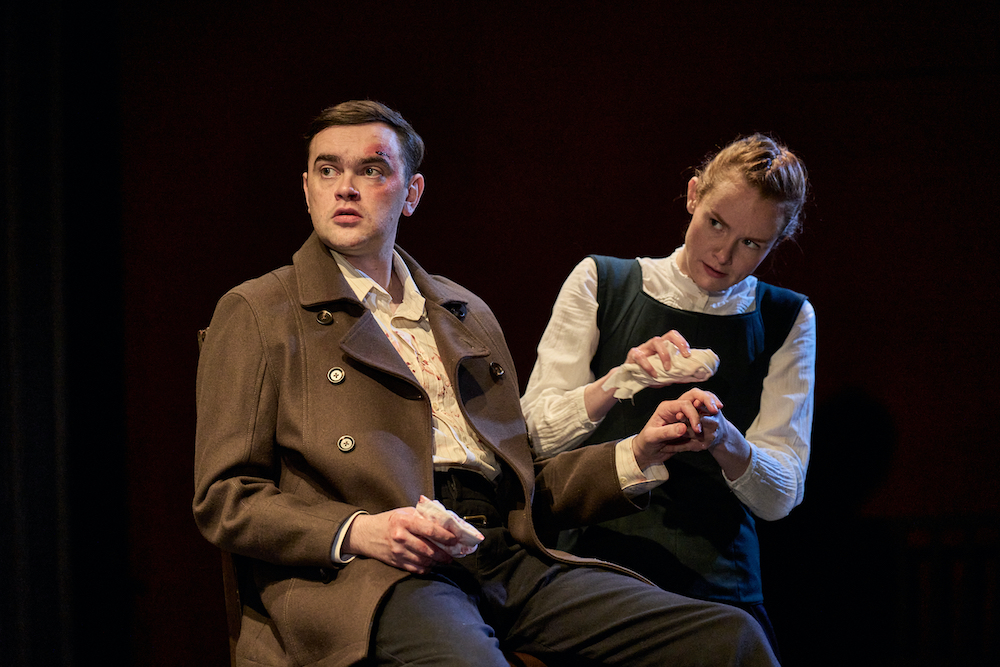Mary, Hampstead Theatre review - compelling study of power politics | reviews, news & interviews
Mary, Hampstead Theatre review - compelling study of power politics
Mary, Hampstead Theatre review - compelling study of power politics
New play about the Queen of Scots is a bit wordy, but well worth it

Scottish playwright Rona Munro is both prolific and ambitious. After her trilogy of historical dramas, The James Plays, was staged in 2016, she continues to work on her cycle of seven works, covering the years from 1406 to 1625, which are designed to give today’s Scotland a contemporary equivalent of Shakespeare’s medieval history cycle.
Her latest, Mary, opens at the Hampstead Theatre because this venue is run by her long-time collaborator, director Roxana Silbert. So who is it about, and how relevant is the play to a general audience?
The title refers to Mary Stuart, Queen of Scots, who became queen six days after her birth in 1542 and was executed by her cousin Elizabeth I of England in 1587. In a tumultuous reign, wedged between two king Jameses, she lived through one childhood marriage to the French dauphin, another marriage to her cousin Lord Darnley, the brutal murder of her favourite Riccio, and another marriage to the Earl of Bothwell. She was then forced to abdicate and fled to England. Phew.
To her credit, Munro focuses her 90-minute drama on a short timespan which culminates in Mary’s abdication in 1567. She also concentrates the drama on one character, James Melville, who had once been Mary’s page in France and is now a diplomat and courtier. In the aftermath of the murder of Darnley, whose house was blown up, Melville is struggling to protect her because she is suspected of complicity in the assassination. When the play begins, he is trying to persuade Thompson, a young servant, to help Mary escape from Holyrood Palace. But another servant, Agnes, is blocking him. The question is not only Mary’s complicity in Darnley’s murder, but also her religion. As a militant Protestant, Agnes is suspicious of Mary’s Catholic faith, while Thompson is more opportunistic, trying to gauge Bothwell’s next move: will he abduct the Queen, or will she turn to him for protection against the Protestant lords? In the event, Melville fails to save Mary from Bothwell’s clutches and, in an original twist to the story, he ends up in Thompson’s power. The young man has been commissioned by the powerful Earl of Moray, Mary’s half-brother, to get Melville’s signature to the Queen’s abdication.
The question is not only Mary’s complicity in Darnley’s murder, but also her religion. As a militant Protestant, Agnes is suspicious of Mary’s Catholic faith, while Thompson is more opportunistic, trying to gauge Bothwell’s next move: will he abduct the Queen, or will she turn to him for protection against the Protestant lords? In the event, Melville fails to save Mary from Bothwell’s clutches and, in an original twist to the story, he ends up in Thompson’s power. The young man has been commissioned by the powerful Earl of Moray, Mary’s half-brother, to get Melville’s signature to the Queen’s abdication.
It’s a classic ethical conundrum: Melville has served Mary for decades, and he believes that she is not a scheming lustful witch, as the Protestants characterise her, but the victim of the vicious power politics of Renaissance Scotland. He also thinks that she has not only been abducted, but also raped. This revelation heightens the drama of his interrogation and poses new choice for Thompson and especially for Agnes. Can Agnes sympathise with Mary as a woman, or will she always be against her because of her religion? And which way will Melville lean?
By putting on stage just one historical character, Melville, and two fictional interlocutors – Thompson and Agnes – Munro concentrates the drama, and creates a psychological and political thriller which pulses with excitement. But it demands concentration. At every point, the argument can go either way, and the history is unfamiliar enough to keep you guessing. The usual conflict between Mary and Elizabeth is barely mentioned and instead we have the ferocious court intrigues of the Stuart throne and the febrile religious fanaticism of the Scottish Reformation.
However distant, or obscure, these events have a resonance today, whether it is the characterisation of money as the only faith, or the discussions about truth and principles. The need for political stability, and the failure of leaders, resonates more in London today than in Edinburgh, although the confidence of Munro’s writing suggests an implicit support for Scottish independence. Questions of loyalty in politics are as relevant as ever, and the imperative to witness the truth becomes crucial. Munro brilliantly interrogates historical fact, and her account of sexual violence is stunningly intense. At the end, she comes up with an equally impressive coup de théâtre.
The playwright’s strong and subtle text gets a superb staging by Roxana Silbert, who starts the story on Ashley Martin-Davis suitably gloomy bare grey set with a sense of inner stillness that is gradually animated as the emotions of the main characters grow. As Melville, Douglas Henshall has a compelling grandeur and a convincing self-questioning demeanour, as well as moments of savage power. Likewise Brian Vernel (Thompson) and Rona Morison (Agnes) (pictured above) travel the play's flint road from calmness to passionate engagement. Uncompromising and difficult, this is an excellently taut and satisfying account of intrigue and betrayal.
Add comment
The future of Arts Journalism
You can stop theartsdesk.com closing!
We urgently need financing to survive. Our fundraising drive has thus far raised £49,000 but we need to reach £100,000 or we will be forced to close. Please contribute here: https://gofund.me/c3f6033d
And if you can forward this information to anyone who might assist, we’d be grateful.

Subscribe to theartsdesk.com
Thank you for continuing to read our work on theartsdesk.com. For unlimited access to every article in its entirety, including our archive of more than 15,000 pieces, we're asking for £5 per month or £40 per year. We feel it's a very good deal, and hope you do too.
To take a subscription now simply click here.
And if you're looking for that extra gift for a friend or family member, why not treat them to a theartsdesk.com gift subscription?
more Theatre
 Macbeth, RSC, Stratford review - Glaswegian gangs and ghoulies prove gripping
Sam Heughan's Macbeth cannot quite find a home in a mobster pub
Macbeth, RSC, Stratford review - Glaswegian gangs and ghoulies prove gripping
Sam Heughan's Macbeth cannot quite find a home in a mobster pub
 The Line of Beauty, Almeida Theatre review - the 80s revisited in theatrically ravishing form
Alan Hollinghurst novel is cunningly filleted, very finely acted
The Line of Beauty, Almeida Theatre review - the 80s revisited in theatrically ravishing form
Alan Hollinghurst novel is cunningly filleted, very finely acted
 Wendy & Peter Pan, Barbican Theatre review - mixed bag of panto and comic play, turned up to 11
The RSC adaptation is aimed at children, though all will thrill to its spectacle
Wendy & Peter Pan, Barbican Theatre review - mixed bag of panto and comic play, turned up to 11
The RSC adaptation is aimed at children, though all will thrill to its spectacle
 Hedda, Orange Tree Theatre review - a monument reimagined, perhaps even improved
Scandinavian masterpiece transplanted into a London reeling from the ravages of war
Hedda, Orange Tree Theatre review - a monument reimagined, perhaps even improved
Scandinavian masterpiece transplanted into a London reeling from the ravages of war
 The Assembled Parties, Hampstead review - a rarity, a well-made play delivered straight
Witty but poignant tribute to the strength of family ties as all around disintegrates
The Assembled Parties, Hampstead review - a rarity, a well-made play delivered straight
Witty but poignant tribute to the strength of family ties as all around disintegrates
 Mary Page Marlowe, Old Vic review - a starry portrait of a splintered life
Tracy Letts's Off Broadway play makes a shimmeringly powerful London debut
Mary Page Marlowe, Old Vic review - a starry portrait of a splintered life
Tracy Letts's Off Broadway play makes a shimmeringly powerful London debut
 Little Brother, Soho Theatre review - light, bright but emotionally true
This Verity Bargate Award-winning dramedy is entertaining as well as thought provoking
Little Brother, Soho Theatre review - light, bright but emotionally true
This Verity Bargate Award-winning dramedy is entertaining as well as thought provoking
 The Unbelievers, Royal Court Theatre - grimly compelling, powerfully performed
Nick Payne's new play is amongst his best
The Unbelievers, Royal Court Theatre - grimly compelling, powerfully performed
Nick Payne's new play is amongst his best
 The Maids, Donmar Warehouse review - vibrant cast lost in a spectacular-looking fever dream
Kip Williams revises Genet, with little gained in the update except eye-popping visuals
The Maids, Donmar Warehouse review - vibrant cast lost in a spectacular-looking fever dream
Kip Williams revises Genet, with little gained in the update except eye-popping visuals
 Ragdoll, Jermyn Street Theatre review - compelling and emotionally truthful
Katherine Moar returns with a Patty Hearst-inspired follow up to her debut hit 'Farm Hall'
Ragdoll, Jermyn Street Theatre review - compelling and emotionally truthful
Katherine Moar returns with a Patty Hearst-inspired follow up to her debut hit 'Farm Hall'
 Troilus and Cressida, Globe Theatre review - a 'problem play' with added problems
Raucous and carnivalesque, but also ugly and incomprehensible
Troilus and Cressida, Globe Theatre review - a 'problem play' with added problems
Raucous and carnivalesque, but also ugly and incomprehensible
 Clarkston, Trafalgar Theatre review - two lads on a road to nowhere
Netflix star, Joe Locke, is the selling point of a production that needs one
Clarkston, Trafalgar Theatre review - two lads on a road to nowhere
Netflix star, Joe Locke, is the selling point of a production that needs one

Comments
Beautifully directed , superb